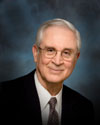 Click to Print Adobe PDF
Click to Print Adobe PDF
Spring 2009 - Vol.4, No.1
Happy Birthday!
Lawrence I. Bonchek, M.D., F.A.C.S., F.A.C.C.
Editor-in-Chief
|
 |
This issue marks the beginning of our fourth year of publication. Gina and I take this opportunity to publicly extend a special congratulations and thank you to our Editorial Board and to all the members of our professional and administrative staffs who have contributed the remarkably informative and useful information in our pages.
The effort of our Editorial Board and our contributors is especially worthy of note, because it is done without the usual rewards of the academic marketplace, intangible though they may be. All human activity is motivated by some kind of reward, whether it be the meager food of a subsistence farmer or the ample bonus of a Wall St. banker, but somewhere in the psychological calculus behind every action there is always some variable component of simple personal satisfaction that ignores material reward. We naturally disdain those whose psychological satisfaction comes from cleverly deluding or even defrauding others, and we deem admirable those for whom the inner satisfaction of personal accomplishment seems to take precedence over pecuniary reward, even when the latter is more obvious. Such is often the case for a fine craftsman who has created a beautiful artifact. But we exalt as most noble those whose actions are made purely for the satisfaction that comes from doing something for others. In the world of medicine, Médecins sans Frontières (Doctors without Borders) comes immediately to mind.
It is in the latter sense that I thank and congratulate our contributors for the time and energy they have devoted to producing the educational articles that have benefited our readers. In the academic world there is an imperative to publish that brings obvious rewards of status and promotion. Indeed, the publication of articles by medical faculty members is often sardonically referred to as "making money." In the realm of community practice, however, the predominant satisfaction to be derived from writing medical articles is the knowledge that one has helped to educate others, and to raise the general level of practice in our community.
It is a source of considerable satisfaction, and to those who haven't yet participated in the Journal, I urge you to get in touch with me to discuss potential topics.
Turning now as I often do to "What's new at the Journal," I direct your attention to a new series we are introducing entitled "Clinical Updates." None of us needs reminding how rapidly the science of medicine advances, and "definitive" clinical articles published here are often superseded by later studies. Occasionally, what seemed a breakthrough at the time it was first reported fails to transform clinical practice in the anticipated manner. In either case, a Clinical Update can be useful and informative. When it seems appropriate, we will ask the original authors to provide one.
In this issue, we have two such updates. One by Dr. Jeffrey Martin is about the JNC 7 Guidelines for management of hypertension, occasioned by the findings of a large randomized trial (ACCOMPLISH [1][2]) that assessed a calcium-channel blocker, an ACE inhibitor, and a diuretic in various combinations. The other, by Dr. Bruce Pokorney, updates us on the status of CT colonography, which he first discussed in the inaugural issue of the Journal three years ago.
Lastly, along the same lines, I am particularly pleased to bring you on the audio CD an interview with Dr. Scott Deron about the implications of the JUPITER trial, which found a beneficial effect of statin therapy for patients with elevated levels of C-reactive protein, despite normal blood lipid levels and no clinical evidence of heart disease. The dramatic implications of this trial are carefully considered by Dr. Deron and I urge you to listen.
In the other interview on the CD, I talk with Bonnie Knox, PhD, who is the Director of the Institute for Professional Development at Lancaster General College. This is an entity that provides educational programs for professional and personal advancement to all members of the LGH family. If you don't know what I mean, that is all the more reason to listen to this valuable interview.
Finally, I have continued my practice of adding to the CD my special commentary from this print issue. In it I comment on the utility of randomized trials for assessing new procedures and operations, in contrast to trials of new drugs.
I hope you find the remainder of the Journal's articles, a kaleidoscope of practical, historical, and ethical discussions, to be rewarding as well as interesting.
References
[1]Jamerson K, Weber MA, Bakris GL, et al. Benazepril plus amlodipine or hydrochlorothiazide for hypertension in high-risk patients. N Engl J Med 2008;359:2417-2428.
[2]Bonchek, LI. What's in a Name? A Critique of Procrustean Acronyms. J Lanc Gen Hosp. 2008; 3 (3):82-83